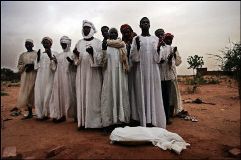Stalemated peace talks for Sudan’s Darfur ‘collapse’ with no deal
By GILBERT DA COSTA, Associated Press writer
ABUJA, Nigeria, Sep 15, 2004 (AP) — Sudan’s rebels and government broke off internationally brokered peace talks for the bloodied Darfur region Wednesday after three weeks with little progress and no deal and the government blamed the United States for the failure.
 Both sides said the talks had collapsed, although they left open the possibility of trying again after a halt of at least three weeks.
Both sides said the talks had collapsed, although they left open the possibility of trying again after a halt of at least three weeks.
Sudan’s government — under growing threat of international sanctions over 19 months of violence in Darfur — insisted U.S. criticism had heartened rebels past the point of compromise.
Sudan’s top negotiator cited U.S. Secretary of State Colin Powell’s declaration last week that Sudan’s government and allied militia had committed acts of genocide against Darfur’s non-Arab villagers.
“The attitude of Colin Powell and America generally was the main cause of the stalemate,” Sudanese envoy Majzoub al-Khalifa Ahmad told The Associated Press.
“It sent a wrong message to the rebels, and that resulted in their hardening their position at the talks,” Ahmad said, insisting Sudan’s problems “will never be solved from outside Africa.”
“It’s unfortunate they’ve become intransigent,” the Sudanese negotiator said of the rebels. “They should be held responsible for this result we’re seeing, the breakdown of the talks.”
Rebels said Sudan’s government was seeking security concessions from the talks that would lead only to the insurgents’ annihilation by government forces.
Talks had made virtually no progress since their Aug. 23 launch in Nigeria’s capital, Abuja, under sponsorship of the 52-nation African Union.
Both sides, after a first round of failed talks in July, had returned under intensifying world pressure to stop bloodletting in Darfur. Pro-government Janjaweed militia there are accused of turning on non-Arab farmers after a February 2003 uprising by two rebel groups.
The United Nations says the conflict has killed at least 50,000 people and driven 1.2 million others from their homes.
Refugees and international agencies give widespread accounts of Janjaweed killing, raping and torturing civilians.
The Abuja talks never made it past the early sticking point of timing of any cantonment of the rebels _ in which the insurgents would return to their camps and stop any attacks.
Rebels insisted that the Janjaweed be fully disarmed first, saying the government otherwise would respond to any rebel peace move with new offensives.
In the final days, Nigerian President Olusegun Obasanjo and other African leaders concentrated simply on trying for an accord that would clear the way for aid agencies’ access to refugees.
Even that failed, with at least one of the two rebel groups saying it would not sign the agreement on humanitarian access until the Janjaweed disarm.
“The talks have collapsed already,” Ahmed Tugod Lissan of the rebel Justice and Equity Movement said. “The president just intended to get us to sign the protocol. But for us it doesn’t make sense.”
An existing accord already provided for humanitarian access, Lissan said.
On Monday, all sides had said they were open to an African Union proposal that negotiations resume in as little as three weeks. “We will abide by that,” Lissan said Tuesday.
In the meantime, Ahmad insisted disarmament of Janjaweed already was under way, and would continue.
“Disarming the Janjaweed is a continuous process. The rebels also need to be placed in safe areas because they’re also attacking civilians. They’re the same as the Janjaweed, there’s no difference,” Ahmad said.
International groups say attacks by the Janjaweed have persisted during the talks.
A first try at talks, in July in Ethiopia, also ended with no deal. An April cease-fire has been largely ignored, despite the presence of about 80 African Union military observers backed up by 300 African troops.
—
Associated Press reporter Dulue Mbachu contributed to this report from Lagos, Nigeria.
